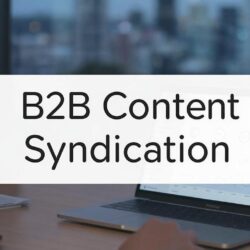In B2B marketing, personalization is the key to capturing attention and fostering strong relationships. Effective B2B Audience Engagement relies on delivering content and experiences that resonate with each prospect. Personalized strategies help businesses connect with their audience, increase interaction, and build trust. This article explores actionable personalization techniques to elevate B2B audience engagement and create meaningful connections.
Understanding Individual Needs
The first step in personalization is understanding the unique needs and preferences of your audience. Developing detailed buyer personas helps identify challenges, goals, and motivations. By knowing your audience deeply, marketers can tailor content that speaks directly to specific roles, industries, or stages of the buyer’s journey, ensuring a higher level of engagement.
Segmenting Your Audience
Audience segmentation is essential for effective personalization. Dividing prospects based on criteria such as industry, company size, job role, and engagement history allows marketers to deliver relevant messages. Segmentation ensures that each audience group receives content aligned with their interests and pain points, improving the chances of meaningful interactions.
Customizing Content
Personalized content is more likely to capture attention and drive engagement. Creating content that addresses specific challenges, provides relevant solutions, and aligns with audience interests increases the perceived value. Email campaigns, blog recommendations, case studies, and webinars can all be tailored to match the needs of each segment, resulting in stronger B2B audience engagement.
Using Dynamic Website Experiences
Web personalization enhances engagement by delivering unique experiences to each visitor. Dynamic content such as recommended resources, targeted pop-ups, and customized landing pages creates a sense of relevance. Visitors are more likely to interact with a website when the content speaks directly to their interests and needs, improving conversion opportunities.
Behavior-Based Personalization
Analyzing user behavior allows marketers to personalize interactions in real time. Tracking page visits, content downloads, email opens, and social media activity provides insights into preferences. Using this data, businesses can deliver targeted content that aligns with current interests, increasing the likelihood of engagement and building stronger relationships.
Leveraging Marketing Automation
Marketing automation platforms simplify the process of personalization at scale. Automated workflows can deliver personalized emails, content recommendations, and follow-ups based on behavior and segmentation. Automation ensures timely delivery of relevant content, maintaining consistent engagement across the customer journey.
Integrating CRM Insights
CRM systems provide valuable information about past interactions, purchase history, and communication preferences. Integrating CRM data with marketing efforts allows for more precise personalization. By understanding previous touchpoints, companies can anticipate needs and provide content that is highly relevant, enhancing B2B audience engagement.
Using AI for Personalization
Artificial intelligence enables advanced personalization by analyzing large datasets and predicting user preferences. AI tools can recommend content, suggest next steps, and optimize communication strategies. Leveraging AI-driven insights ensures that engagement efforts are data-backed, effective, and tailored to the audience.
Interactive Personalization
Interactive content such as quizzes, polls, assessments, and calculators allows audiences to receive customized results. This type of personalization encourages active participation, provides valuable insights about preferences, and strengthens engagement. Interactive experiences make your brand more memorable and relevant to prospects.
Aligning Content with Buyer Journey
Personalization should consider where the prospect is in the buyer’s journey. Early-stage prospects may benefit from educational content and research materials, while mid- and late-stage prospects respond better to case studies, demos, and solution-focused content. Aligning content with the journey ensures relevance and maximizes engagement opportunities.
Measuring Personalization Success
Tracking metrics such as click-through rates, time on page, content downloads, and conversions helps evaluate the effectiveness of personalization efforts. Regular measurement and analysis enable marketers to refine strategies, identify gaps, and optimize campaigns for stronger B2B audience engagement.
Building Trust Through Personalization
Personalized experiences demonstrate that your brand understands and values its audience. Delivering relevant content consistently fosters trust, strengthens relationships, and encourages ongoing engagement. Brands that invest in thoughtful personalization become reliable resources for their B2B audience, creating long-term loyalty.
Understanding Your Audience
The foundation of social media engagement is understanding your audience. Analyze demographics, industry, job roles, and content preferences to craft posts that resonate. Audience insights ensure your social media efforts are targeted and relevant.
Choosing the Right Platforms
Not all social platforms deliver the same results for B2B marketing. LinkedIn is ideal for professional networking and thought leadership, while Twitter and industry-specific forums are great for sharing insights and updates. Selecting the right platforms ensures higher engagement.
Creating Valuable Content
Content that educates, informs, or entertains drives social media engagement. Sharing case studies, industry reports, blogs, and videos provides value to your audience and encourages interactions. Valuable content establishes credibility and fosters trust with prospects.
Consistency in Posting
Regular posting keeps your audience engaged and ensures your brand remains visible. A content calendar helps maintain consistency, plan campaigns, and align posts with business goals. Consistency builds familiarity and encourages ongoing engagement.
Using Visual Content
Visuals such as images, infographics, and videos enhance social media engagement. Visual content is more memorable, increases shares, and captures attention effectively. Incorporating visuals into posts makes your messaging more appealing and interactive.
Engaging Directly with Followers
Responding to comments, participating in discussions, and acknowledging feedback strengthens engagement. Direct interaction shows that your brand values its audience and fosters meaningful connections. Active engagement encourages ongoing participation and loyalty.
Promoting Webinars and Events
Social media is an effective channel to promote webinars, virtual events, and live sessions. Sharing event details and updates increases registration and participation, creating opportunities for direct interaction with prospects.
Leveraging Social Proof
Sharing testimonials, reviews, and success stories on social platforms builds credibility. Social proof demonstrates value and encourages engagement by showing that others trust your brand.
Using Hashtags Strategically
Relevant hashtags increase visibility and reach for your posts. Using industry-specific and trending hashtags helps attract the right audience and encourages engagement from prospects interested in your niche.
Analyzing Performance Metrics
Monitoring metrics such as likes, shares, comments, reach, and click-through rates provides insights into what content resonates. Data-driven analysis allows you to refine social media strategies and improve engagement over time.
Running Targeted Ads
Paid social media campaigns can amplify reach and engagement. Targeted ads based on industry, role, and interests ensure that your content reaches the right audience, complementing organic efforts and boosting interaction.
Building Long-Term Relationships
Social media engagement is most effective when focused on relationship-building. Providing consistent value, interacting authentically, and responding to feedback helps establish trust and encourages repeat engagement from your audience.
Read Full Article : https://acceligize.com/featured-blogs/b2b-audience-engagement-best-practices/
About Us : Acceligize is a global B2B demand generation and technology marketing company helping brands connect with qualified audiences through data-driven strategies. Founded in 2016, it delivers end-to-end lead generation, content syndication, and account-based marketing solutions powered by technology, creativity, and compliance.



